Five Journalists Still Missing In Iran After Mass Arrests

Three days after the detention of 30 journalists at the office of liberal-leaning website Fardaye Eghtesad in Tehran, five remain missing, raising fears they have been detained.

Three days after the detention of 30 journalists at the office of liberal-leaning website Fardaye Eghtesad in Tehran, five remain missing, raising fears they have been detained.
The newspaper's editor, Ali Mirzakhani, deputy editor, Behzad Bahmannezhad, and three video-journalists have not returned home since Monday and no information has been disclosed regarding their whereabouts and conditions.
On Monday evening, security forces raided the office of the economic news site, detaining and holding 30 journalists incommunicado inside the building overnight. They also confiscated all office computers and electronic devices, including mobile phones, and interrogated the staff.
The judiciary’s official news agency, Mizan, released a statement on Tuesday, claiming that the raid and journalists’ arrests were not linked to journalistic activities but were under investigation by a security agency.
Iranian media and observers say the detentions might be linked to a recent revelation published about Iran's international clandestine fund transfers.
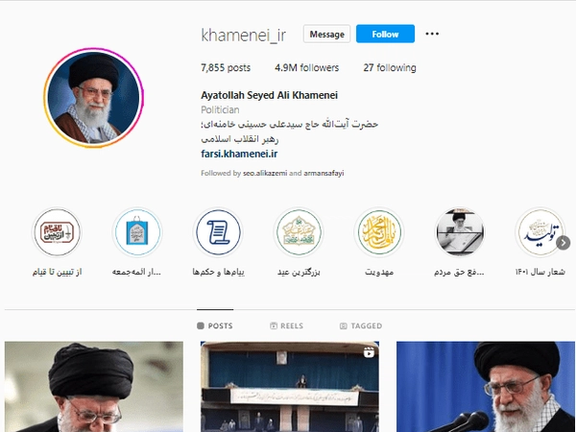
Meta, the owner of Instagram and Facebook, has removed the accounts of Iran’s Supreme Leader Ali Khamenei on the two platforms.
“We have removed these accounts for repeatedly violating our Dangerous Organizations & Individuals policy," Middle East Eye news website quoted a Meta spokesperson as saying.
Based on that policy, “organizations or individuals that proclaim a violent mission or are engaged in violence” are removed from Meta platforms.
According to IranWire news website, Meta’s recent action was taken in response to the accounts’ explicit support for Iran’s proxy groups in the region, such as Hamas and Hezbollah.
Many Iranian activists had previously called on Meta and X to disable Khamenei’s accounts over the flagrant violation of human rights in Iran under his rule.
Instagram, X, Facebook, Telegram and many other platforms are not accessible in Iran as a result of the government’s filtering policy.
Since the Iran-backed Hamas militia in Gaza invaded Israel on October 7, Iran's proxies in Iraq, Syria, Lebanon and Yemen have all acted in support of the group, attacking both Israel and US targets since the war broke out.
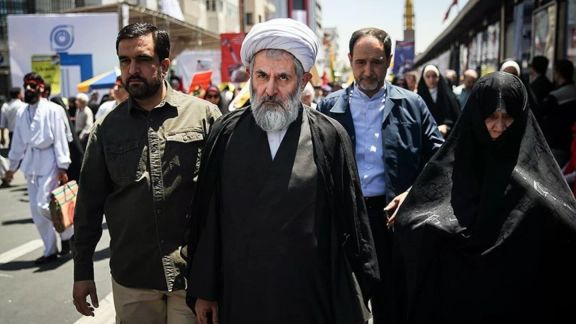
Emboldened by a modest US response to the killing of American soldiers, the former head of IRGC intelligence, Hossein Taeb, has claimed no country dares attack Iran.
Taeb, still a senior Revolutionary Guard official and an advisor to its commander-in-chief, said during an event on Thursday that the Islamic Republic is celebrating its 45th year since its establishment while no superpower has the courage for a military attack on Iran.
This week, the international community witnessed the US retaliation for approximately 160 attacks carried out by Iran-backed militia on US targets in the region since the Gaza war began on October 7, in strikes in Syria, Iraq and Yemen. On February 2, the US carried out airstrikes on more than 85 targets in Syria and Iraq , aiming at Iranian-backed forces including the group responsible for the Jordan strike that killed three American service members and injured over 40 others. A day later, American and British warplanes, with support from six allies, launched strikes at dozens of sites Houthi militants, one of Iran's biggest proxies.
The White House is under pressure mainly by the Republicans for a direct confrontation with Iran, though so far, has preferred to engage more directly with the proxies for fear of a wider conflict.
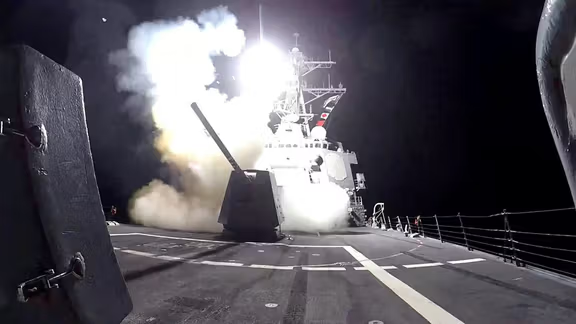
Every year in February, the government in Tehran holds about 10 days of nationwide events and gatherings to mark the anniversary of its establishment, the Islamic Revolution of 1979. The propaganda line has been the same for decades: Iran is a global powerhouse and is thriving despite growing international sanctions and a plethora of domestic problems.
Taeb claimed that “it is impossible for superpowers to escalate pressure on Iran to the point that economic problems and pressure on people's livelihoods lead to collapse.” Iran has been a scene of growing anti-regime labor and civil protests over economic woes and human rights abuses in recent years but the boldest uprising was the nationwide revolt that started after the death of 22-year-old Mahsa Amini in 2022 that came to be known as the Women, Life, Freedom movement.
The regime quashed months of rallies, killing about 600 people and arresting about 22,000. The crackdown on dissent and acts of social disobedience, mainly through women appearing unveiled in public, is intensifying day by day.
Taeb also downplayed the efficacy of measures to pressure Iran by the US and Israel, an idea that surprisingly resonates with countless officials in the US and other countries as well as Iranian dissidents and opposition figures. They concur that punitive measures are not enough to contain Iran in its destabilizing acts as it is advancing its nuclear and missile capabilities, with some saying that the international community’s appeasement with Tehran has only encouraged it. “America sought to confine Iran with the JCPOA (Joint Comprehensive Plan of Action), then with JCPOA 2... it aimed to restrict Tehran's military and regional power, consequently weakening Iran,” Taeb mentioned as instances of the US failure.
He boasted that Iran is now seen as a major threat against the US. "They wanted Iran to be only a normal country, but we turned into a regional power and threat. Now the world acknowledges Iran as one of the three countries challenging American hegemony,” he said, claiming, “Today, they say Iran has become a power of Islamic resistance and a regional force, meaning it will defeat American hegemony and itself become a hegemon."
Last year, Taeb claimed the US had sent messages to the regime through three neighboring countries of Iraq, Qatar and Oman, saying that it is not looking to overthrow the regime. The claims were not corroborated by Washington.
Taeb was pushed out as the head of IRGC’s intelligence in 2022, but maintains significant influence in the country’s intelligence apparatus, with political analyst Morteza Kazemian calling him as “one of the most feared men in Iran's security system.” Taeb has close relations with the Supreme Leader’s son Mojtaba Khamenei, a former comrade during the 1980s war with Iraq.
His dismissal came following multiple mysterious incidents in which IRGC officers and operatives were killed or died in unexplained circumstances. Iran blamed Israel for some of the incidents. Taeb was harshly criticized by social media activists and politicians for failing to detect and prevent Israel's operations in Iran. The fact that an Israeli news outlet, Kaan News reported Taeb's removal from his post several days before its confirmation by Iranian officials, was another indication that Israel had access to insider information from the IRGC Intelligence Organization.

Iran’s Supreme Leader Ali Khamenei has reiterated his calls for a blockade of Israel while Tehran separately denies its role in the Gaza war.
“It is the duty of the governments to cut off political, propaganda and arms aid and not to send consumer goods to the Zionist regime,” Khamenei said on Thursday.
Back in November, Khamenei urged Muslim states to cease oil, food and goods exports to Israel to force Israel into a ceasefire amid its war on Gaza sparked by the October 7 Hamas attacks. At least 1,200 mostly civilians were killed and at least 250 more taken hostage in the single most deadly day for Jews since the Holocaust.
Iran's Yemeni proxy, the Houthis, have taken over the critical Red Sea, the Gulf of Aden, and the Bab el-Mandeb Strait trade route, launching dozens of attacks on vessels since November and forcing shipping to take longer, more expensive alternative routes.
It has since led to multiple retaliatory joint attacks by the US and UK in a bid to harm the Houthis' infrastructure. The Houthis claim they only target Israeli and Israel-bound ships, but its victims have been multinational. The Galaxy Leader, taken captive in November, has 25 crew taken hostage, hailing from the likes of Bulgaria and Romania.
Though Iran has avoided any direct military involvement in the Israel-Hamas conflict, the regime has used its proxy groups such as the Houthis and Hezbollah to attack Israeli and American targets in the region.
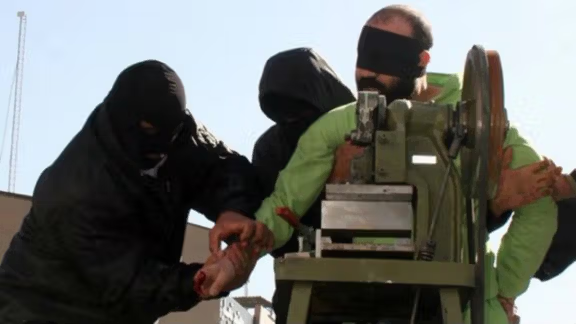
Iran’s judiciary has amputated the fingers of a 35-year-old man for allegedly stealing five sheep from a farm belonging to an IRGC member as the medieval practice gains pace.
According to the Oslo-based Iran Human Rights Organization (IHRNGO), the amputation was carried out last July in the central prison of Iran’s religious city of Qom, the revelation showing a parallel rise in both executions and amputations over the last year.
“The amputation of a man’s fingers for stealing a few sheep by a corrupt system whose officials compete with each other in stealing and embezzling billions of dollars shows the extent of the Islamic Republic’s cruelty and immorality,” said IHRNGO Director Mahmood Amiry-Moghaddam.
According to the Abdorrahman Boroumand Centre, since January 2000, the Iranian authorities have amputated the fingers of at least 131 men, Amnesty International reported in 2022.
The latest victim, known only as Yousef, was working as a builder at the farm when he was arrested. “He denied the theft and insisted he was innocent throughout the 13 months he was behind bars,” IHRNGO quoted the source as saying.
Last month Ali Mozaffari, the Chief Justice of Qom Province, announced that the fingers of two prisoners who were sentenced to amputation for theft were cut off and warned more cases would follow, in spite of its contravening international law.
It comes as Iran's execution rates are also surging. Amid the worst national uprising since the founding of the Islamic Republic, crackdowns on dissent have seen record numbers of executions, the United Nations citing more than 800 in 2023 alone.
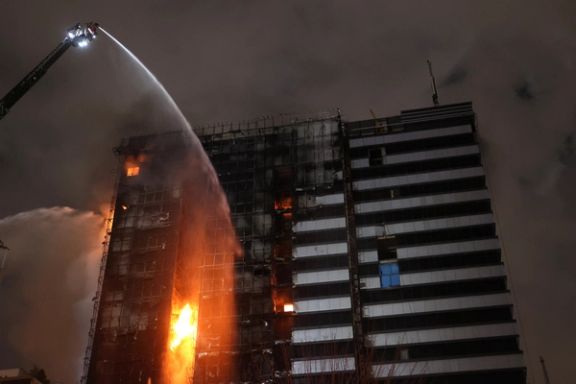
Tehran's Fire Department warned there are 18,000 “high-risk” buildings in the city, demanding the step-by-step implementation of safety measures for high-risk buildings.
“The existence of a significant number of unsafe buildings in Tehran and also the occurrence of such incidents as Plasco and Gandhi Hospital have raised concerns,” Jalal Maleki said.
The Plasco Building was a 20-story high-rise that collapsed in January 2017 after it caught fire. Twenty firefighters were reportedly killed and at least 70 others were injured by the collapse.
Last month, a huge fire broke out at the Gandhi Hospital in Tehran, which followed a warning from the Crisis Prevention and Management Organization of Tehran’s Municipality in December that the city does not have adequate infrastructure and safety measures in place for hospitals. And last June, five buildings that were under construction collapsed in southern Tehran, killing at least three people and injuring more than 10 others.
The new safety plan is intended to reduce the financial pressure on building owners and avoid business closures, but in the last two years, many have faced legal proceedings after lack of compliance with new measures.
After two warnings and a few months' deadline, further legal measures will be implemented, Maleki said.